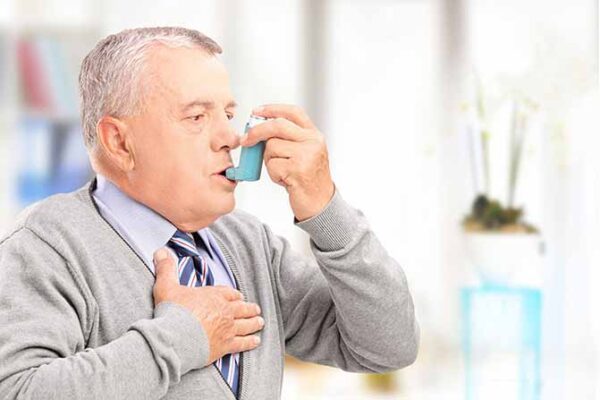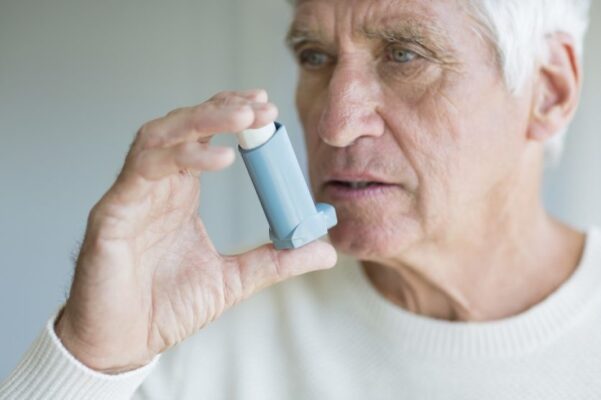People age 65 and older are more likely than the general population to have asthma. Yet research shows older people with asthma are more likely to be underdiagnosed, undertreated and hospitalised.
Age and asthma can be and often are a lethal combination.
Asthma’s symptoms which are shortness of breath and wheezing leave its victims gasping for air. A cough and a tight chest—particularly at night and in the early morning—are intrusive. Elderly people with asthma are more likely to die of this breath-robbing disease than any other age group.
Almost all of these deaths are preventable.
Elderly patients who have asthma can be classified in 2 groups:
1. Those who were diagnosed as children and have carried the diagnosis for decades (long-standing asthma)
2. those who are diagnosed late in life (late onset).
Do not ignore breathlessness
If you are getting breathless, it is very important to see your GP or asthma nurse as soon as possible.
It could be a sign that you have undiagnosed asthma
Many older people don’t ask for help to get their asthma diagnosed because they think their symptoms, such as being short of breath, are just part of getting older.
If your asthma is getting worse then tell your GP or asthma nurse about any new symptoms you notice including breathlessness. They may need to change your medicines or doses so you stay well with your asthma.
Check that you do not have another condition causing you to be short of breath
Reasons for breathlessness vary so as well as asthma, it could be a sign of:
Pneumonia
Heart disease
Obesity
Chronic Obstructive pulmonary disease(COPD)
Your GP or asthma nurse may ask you to do a lung function test where they measure how well you can fill your lungs with air and how well you can breathe out again. As you get older, the results of this test will slowly go down. This is nothing to worry about – it is just a normal part of the ageing process.
What is not a normal part of the ageing process is breathlessness when you are walking upstairs or up a hill. This always needs to be checked out by a GP
If you ignore breathlessness, whether or not you have been diagnosed with asthma, you are putting yourself at risk of a potentially life-threatening asthma attack.
Managing your asthma when you are older
Look for changing symptoms
The symptoms for older people with asthma are generally the same as for younger people, though older people sometimes experience a more serious form of asthma. In people who are 65 and older, asthma affects more women than men.
Even if you’ve had the same or similar symptoms for years, your asthma may change over time as you get older. You may notice:
- fewer asthma symptoms
- more asthma symptoms
- some asthma symptoms that are more obvious than they were before
- your medicines aren’t working as well
- side effects of your asthma medicines seem worse
- new things trigger your asthma
If you spot any of these changes, it’s a good idea to keep a symptom diary so that you can take it to an appointment with your GP or asthma nurse and show them exactly what’s changed.
They can talk to you about ways to avoid your individual triggers and look at any lifestyle factors that could be affecting your asthma – it may be that you need to make some small changes to stay well with your asthma as you get older. Your GP or asthma nurse may also change your medicines or doses.
How your healthcare team can support you
Managing your asthma may become more challenging as you get older as symptoms may become more serious. Also, you may need to manage your asthma alongside treatments for other conditions, such as diabetes or heart disease. Your GP, asthma nurse, consultant and/or pharmacist can help you manage your asthma to help prevent symptoms and cut your risk of a potentially life-threatening asthma attack.


Treatment
Before medications are considered, some lifestyle changes are key.
Because many asthma patients smoke, smoking cessation is critical. Exercise and weight loss are helpful. Allergen avoidance makes sense, although no studies confirm its benefit
The most common treatment is to take inhalers.
Your inhaler technique
To make the most of your asthma medicines, you need to take your inhaler(s) in the right way. Ask your GP, nurse or physiotherapist to check your inhaler technique – even if you’ve been using an inhaler for years it’s worth making sure you haven’t slipped into bad habits without realising.
As you get older, you may find it difficult to use your inhaler correctly – for instance, if another condition, such as arthritis, affects your hands and fingers. If you find it difficult to use your inhaler, ask your GP or asthma nurse for advice. There’s a wide range of inhalers available and you may find it easier to try a different device.
Your asthma medicines
Your medicines may need to work harder as your lungs get older, so it’s a good idea to see your GP for an asthma review at least once a year so you can check that the medicines you’re taking are the right ones for you and that you’re using them correctly. The best treatment plan for you now might be different to the one you had when you were younger.
Your asthma action plan
A written asthma action plan can help you to stay well with your asthma, and to manage your medicines and triggers. It can also help remind you what to do if you have an asthma attack.
Your GP or asthma nurse can help you write an action plan or check that your current one is up to date. Download one now and take it to your next asthma review.
Potential side effects
For some people, some side effects of asthma medicines, such as an increased heart rate or feeling shaky after using your reliever inhaler, can feel worse as you get older. Long-term use of oral steroids (prednisolone tablets) and high doses of inhaled steroids (in some preventer and combination inhalers) can increase the risk of developing cataracts and osteoporosis. It can also lead to thinner skin that bruises easily. Not everyone will experience these side effects. Your GP, asthma nurse or consultant can talk to you about:
- any worries you have about your asthma medicines
- your individual risk
- the different things you can do to help prevent and reduce any side effects you’re getting from your asthma medicines.
It’s important to keep taking your asthma medicines, but talk to your GP or asthma nurse as soon as possible if you’re worried about any side effects. Regular asthma reviews (at least once a year) will also give your GP or asthma nurse a chance to change your medicines so you’re taking the lowest possible dose.
Manage your triggers
Some older people find they’re sensitive to things they’ve been around for years that weren’t a problem before, or to completely new things. Changes, such as retiring to a new area or moving house, can expose you to new triggers.
As you get older you might be more at risk of lung infections or take longer to recover if you get a viral infection. As well as reading up about all the things you can do to ward off colds and flu, speak to your GP or asthma nurse about whether you need the flu vaccine every year and/or a one-off pneumococcal vaccine to protect against pneumonia.
Keep well
As you get older, there are lots of things you can do to help you stay well with your asthma:
- Studies have shown that people who keep exercising as they get older stay healthier than people who don’t.
- Some research has found that overweight people with asthma who lose weight have fewer asthma symptoms.
- Evidence shows stopping smoking means you won’t get as many asthma symptoms and that your medicines will be more effective.
- Stress, anxiety and depression can make your asthma worse because they can be a trigger for some people, so if you’re worried, down and/or lonely, talk to someone about how you feel, such as:
- your GP or asthma nurse
- one of our asthma nurse specialists on our Helpline: 0300 222 5800(9am – 5pm; Mon – Fri)
- the Age UKAdvice Line: 0800 169 2081.
Getting asthma when you are older
There is evidence that asthma is often underdiagnosed in older adults – sometimes because people don’t tell their doctor about their symptoms and sometimes because it gets misdiagnosed as a different condition. So even if you haven’t ever had asthma symptoms before, it’s important to tell your GP as soon as possible if you are experiencing any of the following:
- Cough especially at night
- Wheeze
- Breathlessness
- Chest tightness
You d0 not need to have all these symptoms to have asthma.
It is also useful to remember that:
- Many people aged 65 and older get their first asthma symptoms after an upper respiratory (chest) infection.
- Obstructive sleep apnea (OSA) – a relatively common condition where the walls of the throat relax and narrow during sleep interrupting normal breathing – may be linked to asthma. This can be treated by wearing a specially designed mask at night connected to a machine.
Source Asthma UK

